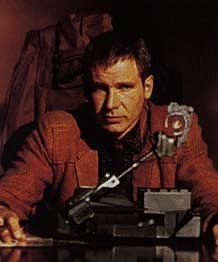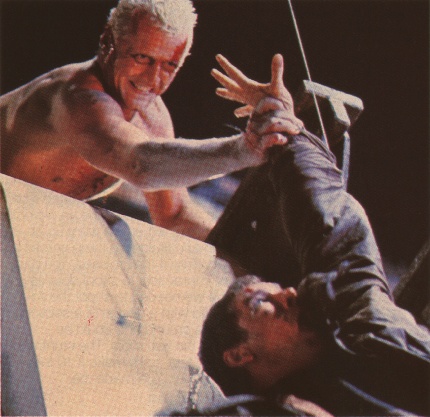 The fictional "Voight-Kampff" test for whether someone is a replicant is very complicated, and can only be administered by specially trained judges (compare this test to the Turing Test)
The fictional "Voight-Kampff" test for whether someone is a replicant is very complicated, and can only be administered by specially trained judges (compare this test to the Turing Test)
The movie suggests this in subtle ways, which you may not notice the first time you watch it. Here is one piece of evidence. Recall that Deckard knows about Rachael's childhood memories, because they were implanted. But then at one point Deckard has a dream of a unicorn. At the end of the movie, the other detective leaves an origami unicorn where Deckard can find it. This suggests that the other detective knows about Deckard's dreams and memories--which he could only do if Deckard were also a replicant.
Recall also that after Rachael learns she's a replicant, she challenges Deckard, "You know that Voight-Kampff test of yours? Did you ever take that test yourself?" Deckard never answers this question.
(The director has said very clearly in interviews that he wanted the movie to raise the possibility that Deckard is a replicant. In the Philip K. Dick story on which this movie is based, this is a more explicit theme.)
 In the movie, what's supposed to distinguish humans from replicants is their ability to feel certain emotions, especially empathy. But empathy is a trait that many of the human characters we meet never display. (Consider the police captain and the other detective, for example.) Whereas at the end of the movie, Roy, a replicant, is the character who displays this trait the most. As his own death approaches, Roy starts to appreciate life so much that he doesn't want to let Deckard die.
In the movie, what's supposed to distinguish humans from replicants is their ability to feel certain emotions, especially empathy. But empathy is a trait that many of the human characters we meet never display. (Consider the police captain and the other detective, for example.) Whereas at the end of the movie, Roy, a replicant, is the character who displays this trait the most. As his own death approaches, Roy starts to appreciate life so much that he doesn't want to let Deckard die.